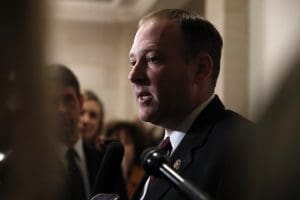Republicans claim to honor MLK right after opposing one of his major achievements
Nearly every single House Republican rejected the Voting Rights Advancement Act last month.

House Republicans spent Monday morning sharing messages aimed at honoring the legacy of Dr. Martin Luther King Jr., just weeks after they voted against restoring one of his signature legislative achievements.
Rep. Lee Zeldin (R-NY) said that the King’s “fight for equality helped transform America into a more just nation. As a civil rights champion, Dr. King’s love for his fellow man made him one of the finest leaders our country has ever had.”
Last month, Zeldin was one of the 186 House Republicans members who voted against H.R. 4, the Voting Rights Advancement Act. The proposal, sponsored by Rep. Terri Sewell (D-AL), aims to undo some of the damage to the Voting Rights Act inflicted by a 2013 Supreme Court ruling and to curb several techniques Republicans have utilized to suppress minority turnout. Just one Republican joined all 227 House Democrats present in voting to pass the bill.
Zeldin was not alone. The House Republican Conference tweeted Monday, “Today as we honor the life and legacy of Reverend Dr. Martin Luther King Jr.’s, we are reminded of his courage and perseverance that will be remembered for generations to come.”
Rep. Martha Roby (R-AL) tweeted that King’s “leadership & courage changed the course of history, & we can all benefit from Dr. King’s powerful example.”
Rep. Michael Cloud (R-TX) urged the nation to “pray that we live with the courage and the sense of purpose that he lived with. May his DREAM live on.”
Rep. Rick Allen (R-GA) said King “led an unwavering and peaceful march toward harmony in America,” and that “we celebrate his memory – a lifelong faith in justice and the profound conviction that God creates us all equal.”
King, along with the larger Civil Rights movement he helped lead, made enactment of the Voting Rights Act a major priority during the 1950s and ’60s.
In his famous 1957 “Give Us the Ballot” address, he highlighted the fact that in many states, it was virtually impossible for black citizens to register to vote. He warned that “all types of conniving methods are still being used to prevent Negroes from becoming registered voters.”
“The denial of this sacred right is a tragic betrayal of the highest mandates of our democratic tradition. And so our most urgent request to the president of the United States and every member of Congress is to give us the right to vote,” King said at the time.
After the 1964 Civil Rights Act failed to adequately address the problem, King raised the issue directly with President Lyndon Johnson, telling him, “the only states that you didn’t carry in the South, five Southern states, have less than 40% of the Negroes registered to vote.”
Johnson encouraged King to highlight the issue of voter suppression.
In March 1965, King and other Civil Rights figures helped bring voter suppression to the nation’s consciousness through a series of attempted marches in Selma, Alabama. Police responded brutally with billy clubs as they marched peacefully for the right to participate in their democracy. The images of the Bloody Sunday march spurred Congress to finally act.
By August, the King-backed Voting Rights Act was law.
As House Republicans attempted to drape themselves in the legacy they have sought to undermine on Monday, King’s daughter Bernice King, as well as the King Center for Nonviolent Social Change, which she runs, used the MLK Day holiday to highlight the ongoing issue of voter suppression — a huge part of what the Voting Rights Advancement Act would address.
“You can’t take away someone’s right to vote just because they haven’t decided to exercise it,” she told Reuters on Friday. “When you take people off the voter rolls because they haven’t chosen to exercise their rights, to me, is suppression.”
On Thursday last week, she appeared to appeal directly to lawmakers, tweeting, “Please don’t quote #MLK on #MLKDay, then suppress the vote and support systemic oppression on Tuesday.”
The Voting Rights Advancement Act is one of more than 400 pieces of legislation being blocked in the Senate by Majority Leader Mitch McConnell. McConnell (R-KY) on Monday called King “one of America’s greatest heroes.”
Even if it passes the Senate, it is likely to be vetoed, as the Trump administration has said it opposes the bill.
On Sunday, Mike Pence also attempted to invoke King’s legacy, claiming, “Dr. King was one of the heroes of my youth.”
Last year, Martin Luther King III, King’s eldest son, slammed Pence for citing his father in arguing for Donald Trump’s proposed U.S.-Mexico border wall.
“Martin Luther King Jr. was a bridge builder, not a wall builder,” he said at the time. “Martin Luther King Jr. would say love, not hate, would make America great.”
Published with permission of The American Independent Foundation.
Recommended

Florida abortion ban puts GOP Rep. Anna Paulina Luna’s anti-choice views in spotlight
Luna supports abortions bans with no exceptions for rape
By Jesse Valentine - May 07, 2024
Republican Caroleene Dobson wants Alabama abortion ban to go nationwide
Dobson is the Republican candidate in what will be one of the most-watched House races of 2024.
By Jesse Valentine - April 30, 2024
Direct mailers distort California Democrat Will Rollins’ record
Rollins, a former federal prosecutor, is challenging incumbent GOP Rep. Ken Calvert.
By Jesse Valentine - April 25, 2024













































































